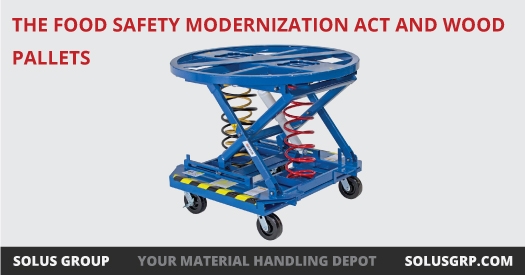We use cookies to make your experience better. To comply with the new e-Privacy directive, we need to ask for your consent to set the cookies. Learn more.
The Food Safety Modernization Act and Wood Pallets
Shippers, receivers, loaders, and carriers who transport food are still coming to grips with the Food Safety Modernization Act (FSMA). President Obama signed the bill in 2011, and since then, the FDA has added a number of rules specifying measures that those involved in food transportation must follow.
The Food Safety Modernization Act (FSMA)
The premise of the law is that everyone involved in the food supply chain should actively prevent contamination to reduce foodborne illnesses. Previous laws mandated how to respond to contamination — this law seeks to stamp it out altogether.
There are rules in place for all stages of the supply chain, so it's no surprise that pallets are a big part of the conversation — after all, most of our food spends a great deal of its life travelling on them. And while the law doesn't specifically prohibit the use of wood pallets in food transportation, it does encourage more hygienic options, which practically speaking means plastic or metal.
Final Rule on Sanitary Transportation of Human and Animal Food
One of the seven foundational rules that the FDA created for the new law addresses hygiene during the transportation process. Specifically, it requires:
-
Proper temperature controls
-
Prevention of raw food from touching ready-to-eat food
-
Protection of food from items in previous loads
-
Protection of food from cross-contact (such as from an allergen)
Again, these requirements don't necessarily ban wood pallets. However, meeting the above requirements is much simpler with alternative materials, like plastic and metal.
Plastic and metal pallets offer big advantages over wood in terms of hygiene.
Wood absorbs many of the substances it comes into contact with, while plastic and metal resist absorption. Metal and plastic also have fewer nooks and crannies for crumbs, bits, or juices to seep into.
In addition to metal and plastic staying cleaner naturally, they are also easier to sanitize when something does contaminate them or when a shipper wants to reuse a pallet. Wood pallets cannot be reliably cleaned, which is why the pharmaceutical industry abandoned them decades ago.
Food safety is only as good as its weakest link.
The FSMA attempts to address all stages of the supply chain to ensure good practices throughout. Because of the importance of temperature control and expiration dates, high-tech RFID tags are being used by some companies to keep track of food on pallets.

A pallet-pool company in Orlando, Florida called iGPS, exclusively stocks RFID-tagged, plastic pallets. The president of iGPS, Rex Lowe, told Food Logistics that their RFID-tagged pallets help customers know exactly where a pallet is located and when it needs to go out to the shelf to prevent expired food.
His company is also experimenting with a tag that "can track temperature to within one tenth of a degree around the unit load that it’s carrying and it can report back the temperature range every 15 minutes." These innovations will allow precise control throughout the transportation process, which is just what the FSMA seeks to promote.
Of course, every step of the supply chain has room for improvements. New pallet carousels are available with stainless steel tops to minimize contamination and simplify sanitation. Trucks with more advanced temperature-regulation systems will help keep food at safe temperatures on even the hottest of days.
The FSMA may seem like another regulation headache, but its goal of reducing foodborne illness is a lofty one.
Everyone in the food supply chain has a role to play, and technology continues making that role easier to fulfill. Anyone with questions can visit the Food Safety Modernization Act website, which posts frequently asked questions, fact sheets, and contact information for specific questions.
References:
Hoffman, Maria. "Building a Better Pallet." FoodLogistics. AC Business Media, 17 May 2012.
"Key Requirements: Final Rule on Sanitary Transportation of Human and Animal Food." FDA. U.S. Food and Drug Administration, 5 Apr. 2016. PDF. 2 Nov. 2017.
Roberti, Mark. RFID's Role in Food Safety. RFIDJournal. Emerald Expositions, LLC., 29 July 2013.
Roessler, Ryan. "Hygienic Pallets Up the Sanitization of Supply Chains." FoodManufacturing. Advantage Business Media, 3 Apr. 2017. Web. 2 Nov. 2017.
